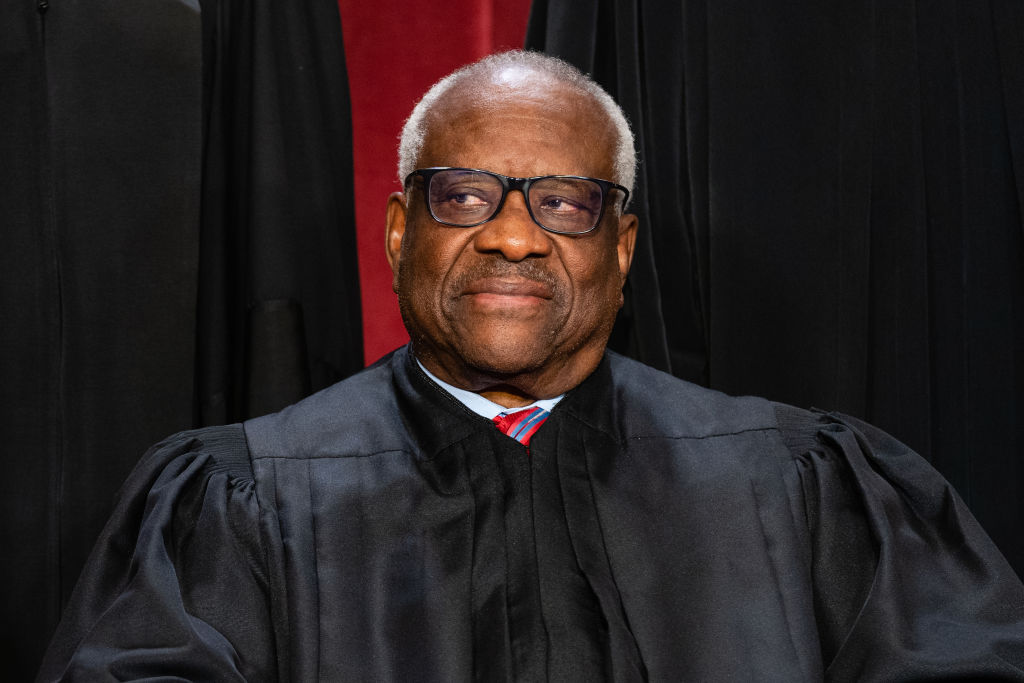
Each year in October, the Supreme Court justices kick off their new term by publishing a terse list of what cases they’ll hear. This year, one sentence on that list gave liberal court observers hope that Justice Clarence Thomas might recuse himself from decisions related to former President Donald Trump’s effort to overturn the 2020 election, given the role Thomas’ wife Virginia Thomas played in promoting false claims of election fraud within Trump’s inner circle.
The justices had rejected a request by John Eastman, Trump’s former lawyer, to appeal a ruling that he hand over emails to Congressional investigators looking into Trump’s efforts to overturn the 2020 election. “Justice Thomas took no part in the consideration or decision of this petition,” read the sentence, without giving Thomas’ reason for not weighing in.
Now Democrats in Congress and liberal legal scholars are calling for Thomas to recuse himself from other cases likely to come before the Court related to the 2020 election and the Jan. 6 attack on the Capitol, including an expected appeal to a decision by the Colorado Supreme Court to strip Trump’s name from the state’s Republican primary ballot.
The court ruled on Tuesday in a 4-3 decision that Trump is ineligible for the White House under the U.S. Constitution’s insurrection clause, citing his actions surrounding the Capitol riot.
Trump’s campaign has denounced the decision and vowed to appeal it to the US Supreme Court, which is already considering a request from Special Counsel Jack Smith that the court decide if Trump is immune from charges for trying to overturn the 2020 election.
More From TIME
This puts the spotlight further on Justice Thomas, whose wife Virginia was deeply involved in spreading false claims to Trump’s close advisors and trying to get the 2020 election results reversed.
Thomas “has no business hearing this case. Why? Because his wife was a major player in the whole insurrection,” LaDoris Cordell, a retired California superior court judge, said on MSNBC on Wednesday., “He should, if he had principles, recuse himself.”
Thomas has been in the spotlight much of the year as investigative reports have raised ethics questions about his willingness to accept loans, expensive flights and other gifts from Republican donors. In response to the reports, the Supreme Court in November formally adopted what it called a new code of conduct, but did not say how it would be enforced.
Last week, before the Colorado ruling, a group of House Democrats led by Rep. Hank Johnson of Georgia sent a letter to Thomas urging him to recuse himself from Smith’s request, “and any other decisions in the case of United States v. Trump.” The 7 co-signers included Reps. Jamie Raskin of Maryland and Alexandria Ocasio-Cortez of New York.
“These details about your wife’s activities raise serious questions about your ability to be or even to appear impartial in any cases before the Supreme Court involving the 2020 election and the January 6th insurrection,” the lawmakers wrote, noting Virginia Thomas had attended the pro-Trump rally that preceded the Jan. 6 attack, and was deeply involved in the “Stop the Steal” movement.
The letter also highlighted how the Court’s new code of conduct calls for Justices to recuse themselves if their spouse has “interest that could be substantially affected by the outcome of the proceeding.”
Despite his recent decision to recuse himself from Eastman’s appeal, Thomas is unlikely to step back from either the Jack Smith request or Trump’s eventual appeal of the decision in Colorado, says Jonathan Turley, a George Washington University Law School professor.
“I’m skeptical he would adopt that type of sweeping recusal position,” Turley says, because Supreme Court justices have historically tried to limit when they recuse themselves given that the court is the final arbiter in the country and a recusal could lead to a tie vote in the nine-member court.
The Colorado ballot case “holds such momentous importance for both the Constitution and the country that the expectation is that he will rule with his colleagues,” Turley says.
Turley believes that the Colorado decision went too far in banning Trump from the ballot, and argued that Chief Justice John Roberts should try to corral a rare unanimous decision overturning the ruling. “There are certain moments in history that call on the court to speak in one voice,” Turley said. “This is one of those moments.”
More Must-Reads From TIME
- The 100 Most Influential People of 2024
- Coco Gauff Is Playing for Herself Now
- Scenes From Pro-Palestinian Encampments Across U.S. Universities
- 6 Compliments That Land Every Time
- If You're Dating Right Now , You're Brave: Column
- The AI That Could Heal a Divided Internet
- Fallout Is a Brilliant Model for the Future of Video Game Adaptations
- Want Weekly Recs on What to Watch, Read, and More? Sign Up for Worth Your Time
Contact us at letters@time.com